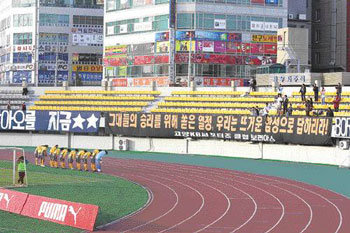Church-Based Team Could Make K-League
Church-Based Team Could Make K-League
Posted November. 23, 2006 06:49,

The championship finals of the N-League, the national amateur football league below the level of Koreas K-League, took place between Gimpo Hallelujah and Goyang KB at 2:00 p.m. on November 22 at Gimpo Stadium in Gyeonggi Province.
Just before the kick-off, players of Team Hallelujah knelt on the ground praying together. The theme of their fervent prayer was Let us advance to the K-League so we can let people know more about God.
Members of Hallelujah live together in a building, which is shared with a day care center, located in Hanam City, Gyeonggi Province. Each of the seven rooms is shared by three or four teammates. Some of them sleep in the living room.
Among the eleven N-League teams, Hallelujah is the most poorly funded team. Ulsan Mipo Hyundai and Goyang KB get annual budgets of between 2.2-2.5 billion won. Other teams get around 1.5 billion. On the other hand, Hallelujah is run with less than a billion won raised from support of churches and protestant Christians all over the nation. Their home stadium is the only one in the league covered with artificial grass. In addition, they have only a few substitute players on the bench.
A team in this dreadful condition won the second term of the league with seven wins, two draws and one loss. Everyone was surprised.
Lee Seong-gil (31) and Seong Ho-sang (27), whose combined goals number 11 out of the teams total 15 goals for the second term, have been playing together on Hallelujah for seven years. Lee Seong-gil, who was chosen as the MVP of the second term, has refused numerous scouting offers from other teams.
He wants neither fame nor money. He just wants to let more people learn about God through football. Lee said, Say our opponents are Goliath, we are David. Just as David did, we also want to win so that we can advance to the K-League.
After this season, Hallelujah will move their base city from Gimpo to Ansan. Even though Ansan seems quite enthusiastic to bring the team over, 5 billion won, which is the least cost that takes to run a K-League team, is still a burden.
Lee Young-moo, president of Hallelujah, said, For the time being, we just want to concentrate on getting the promotion. There must be a way to get things solved once we reach there.
Although training in a better environment than Hallelujah, KB also has its own concerns. They had an overwhelming record of eight wins and two draws early on, but things started to go haywire since they changed their uniform in October. They had a draw and two losses. On November 20, they even had a sacrificial rite with a pigs head on a table. Their prospects remain unclear even if they get a league promotion. It is suspicious whether foreign investors will approve the operation of a professional team, which costs billions of won.
Although it was a historical match, deciding the first team ever in Korean football to advance to a higher league, the stands were mostly empty. Excluding supporters of both teams, which were slightly more than 20, some city authorities, and students who came in groups from school, the number of pure spectators was a mere few dozens. Among the coaches of K-League teams, which are to encounter one of the two teams next season, Andy Egli, the Swiss manager of Busan I-Park was the only one to show up.
Egli said, There are lots of Koreans who love football and they are very passionate. The players skills are better than Switzerland, too. I just cant understand why there are so few people at the games.
Despite their all-out battle, the two teams tied 0-0 with no goals.
Park Do-hyeons middle-range shot for Hallelujah hit the crossbar in the 21st minute. Hallelujahs goalie Hwang Hee-hun delivered his team with a series of crucial saves, including the block of Kim Jae-gus (KB) penalty kick in the 68th minute. The second match of the series, which will finally decide the winner, is scheduled for 3:00 p.m. on November 26 at Goyang Stadium.
jaeyuna@donga.com







